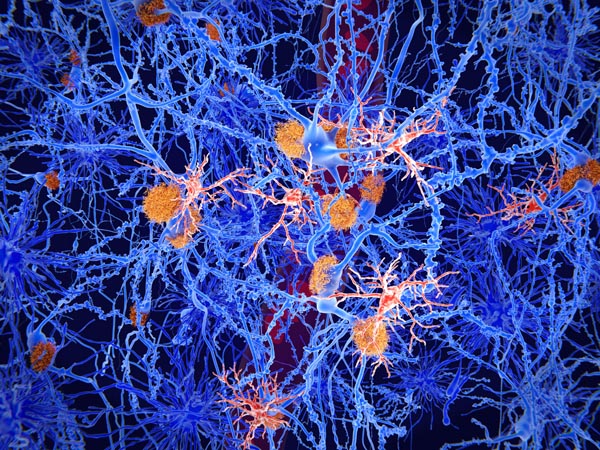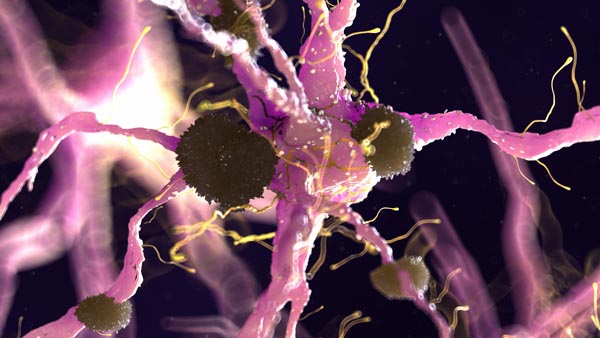Alzheimer’s Disease
There are few medical ailments that have touched as many people’s lives as this terrible condition. Alzheimer’s is a disease that affects those suffering from it, as well as their families, on a completely different level than many other common ailments.
 Before we start talking about Alzheimer’s disease and medical cannabis, it is important to mention that this article may read a little differently than many of our other Kanteeva articles.
Before we start talking about Alzheimer’s disease and medical cannabis, it is important to mention that this article may read a little differently than many of our other Kanteeva articles.
This is because one of the Kanteeva team members specifically requested to research and write this article on a more personal level.
Tony is a valued team member here at Kanteeva and as a nurse, he has spent many years working with people suffering from Alzheimer’s disease. Tony has firsthand experience and knowledge of how devastating this disease can be on both the patients who suffer directly from Alzheimer’s, as well as their families and caregivers who support them.
We hope that you find this article on Alzheimer’s disease and medical cannabis both educational and helpful to you and your loved ones.
As always, our goal here at Kanteeva is to provide you with the information that you will need to make an educated and informed decision as to whether medical cannabis may be an option to help you or a loved one deal with the symptoms of Alzheimer’s disease.
After reading this article, you should have a basic understanding about medical cannabis and Alzheimer’s disease so that you can further discuss your options with your healthcare provider(s).
If you have any questions after reading this article, please leave them in the comment area below and a Kanteeva team member will respond back to you as soon as possible.
Tony will now take us on a journey to talk about his personal and professional experience dealing with Alzheimer’s disease and medical cannabis.
A Quick Introduction from Tony
As a member of the Kanteeva staff and family, I have been blessed with the ability to learn, connect and grow along with the many other Kanteeva team members and you: our audience, our friends, our family. With that being said, it is important that I share a little bit about my background so that you can better understand why I have requested to write to you about Alzheimer’s disease and medical cannabis.
As a practicing nurse, I have spent many years working with patients who are suffering from Alzheimer’s disease and have also helped their families to better understand the process of this disease, as well as the treatment options available to them. I have spent a significant amount of time trying to better understand this ailment both personally and professionally.
I have done this by attending courses and continuing education on what causes Alzheimer’s, how it is currently treated and what may be available in the future.
Let us begin by looking at Alzheimer’s disease and how medical cannabis may be changing the outlook for patients in the near future who are trying to fight this disease to the best of their abilities.
- Tony, Kanteeva Team and Community Member
What Is Alzheimer’s Disease?

The Mayo Clinic defines Alzheimer’s disease saying:
Alzheimer's disease is a progressive disorder that causes brain cells to waste away (degenerate) and die.
While this definition does a great job of explaining what is causing the symptoms of Alzheimer’s disease on a physical level, what this definition cannot express is how devastating this disease is on a personal level. Alzheimer’s is a progressive disorder that causes brain cells to slowly degenerate and die, meanwhile the person who it is happening to slowly loses their personality, independence, memory and much more.
In most cases, Alzheimer’s disease affects people age 65 or older but contrary to popular belief Alzheimer’s is not just a disease of old age. According to the Alzheimer’s Foundation, approximately 200,000 Americans under the age of 65 have early-onset Alzheimer’s. According to the Alzheimer’s Association, 50 million people of varying age worldwide are living with dementia. That number is expected to grow to 76 million by 2030.
Alzheimer’s disease is a cruel process that starts with a few forgetful moments and slowly escalates from there to the point that people cannot remember loved ones, family members, their own children, how to walk, talk, and eventually even how to do many tasks essential for survival, like remembering how to eat, drink or even swallow.
Ultimately, this is why Alzheimer’s disease is considered a terminal illness.
Unlike many other terminal illnesses however, Alzheimer’s disease is an ailment that plays out over a long period of time and many people will often battle with Alzheimer’s disease for many years, possibly decades.
In the medical community, there are multiple different models that are used to show the progression of Alzheimer’s disease. Some models are very simple and break the disease down into as little as 3 phases that include early, moderate and end-stage Alzheimer’s. The model most commonly used among medical professionals is known as the Global Deterioration Scale, or GDS. This system was developed by Dr. Barry Reisberg of New York University. In his model, the progression of Alzheimer’s disease is broken down to include 7 different stages.
Dr. Reisberg’s 7 Stages of Alzheimer’s Disease Progression

For the purposes of this article, it is important to have a basic understanding of the 7 stages of Alzheimer’s disease. For that reason, the 7 stages listed below are going to be summarized concisely.
If you would like to know more information about the 7 stages of Alzheimer’s disease, please read this in depth and detailed article from the Fisher Center for Alzheimer’s Research Foundation.
Stage 1: Normal
This is the stage where the initial symptoms of Alzheimer’s disease have not yet presented themselves. It is considered to be within the same parameters of anyone with a healthy mental and cognitive status.
Stage 2: Normal Aged Forgetfulness
As we age, it is expected for us to forget things every now and then. This second stage of Alzheimner’s disease can at first seem insignificant or even go unnoticed. It is often overlooked as simple absent mindedness that we are all too familiar with: misplaced car keys, losing your cell phone, forgetting to take medication on time, etc.
A teacher that our Kanteeva team member Tony had in nursing school explained normal aged forgetfulness well by saying, “Forgetting where you put your car keys is normal forgetfulness. Forgetting that you own a car may be a sign of Alzheimer’s disease.”
Stage 3: Mild Cognitive Impairment
This is the stage when many people will often have very subtle, but noticeable, lapses in memory. For example, people in this stage may tell the same story or ask the same question multiple times. When people are still among the workforce and begin to hit stage 3 their job performance usually starts to decline.
This stage can be tricky to diagnose as it can be challenging to determine if the issues people are facing with mild cognitive impairment are warning signs of Alzheimer’s disease or are just a case of normal aged forgetfulness. Regardless, it is important for people to seek help as soon as possible because testing and consultation with an Alzheimer’s specialist can clarify if someone is dealing with normal aged forgetfulness or showing the early warning signs of Alzheimer’s disease.
Typically, Stage 3 of Alzheimer’s disease usually lasts 2 to 3 years. However, every individual is different and some people may be in this stage of Alzheimer’s disease for a much longer, or shorter, length of time.
Stage 4: Mild Alzheimer’s Disease
This is when the symptoms of Alzheimer’s disease really start to become apparent. During this stage, many people begin to have issues with things such as paying bills, preparing meals for guests and going grocery shopping.
Other key warning signs of this stage include things like forgetting major recent events like going on vacation or seeing a family member that rarely visits. During Stage 4, many people also have trouble remembering what day of the week it is, what month it is, what season it is, and even what year it is.
Sadly, many people cope with these confusing experiences by isolating themselves from the world and many psychiatrists use the term “flattening of affect and withdrawal” to define this stage of Alzheimer’s. For families and friends, the symptoms of this stage can typically be described as seeing someone they love who is becoming isolated and detached from their “previous” life.
It is important to note that while many people in Stage 4 have difficulty remembering what season it is, they are still able to appropriately dress for the weather outside. Many people in stage 4 are still able to be independent and live by themselves without too much confusion or harm.
Stage 4 is often the point in time when many people are first diagnosed with Alzheimer’s disease. This stage typically lasts only around 2 years before progressing to stage 5.
Stage 5: Moderate Alzheimer’s Disease
This is the stage where living independently with Alzheimer’s becomes dangerous for individuals suffering from this ailment. There are a few key issues that can be observed during this stage but the most obvious one is that during this stage of Alzheimer’s disease people often lose the ability to dress appropriately for the weather.
For example, they may frequently wear shorts when it’s very cold outside or sweatpants and sweatshirts during the heat of summer. Many people will often wear the same clothing day after day unless someone is there to remind them that they need to change clothes.
During Stage 5 of Alzheimer’s disease many people often forget to eat and when they do eat it is often not the appropriate type or amount of food necessary for maintaining adequate nutritional health. Also, many people in this stage will often be unable to recall recent major events and even aspects of daily life like who the current president is, the weather conditions that day or the day before, their current address, recent outings or important local events.
As a result of the many problems often seen during Stage 5, living alone is usually impossible for many people as they may harm or injure themselves because of decreased orientation to what is going on around them. Typically, this stage lasts an average of 1.5 years before progressing into Stage 6.
Stage 6: Moderately Severe Alzheimer’s Disease
Stage 6 can be very complicated to try and explain in detail. In the medical community, providers and caregivers know that there are 5 phases included within Stage 6 that include Stages 6a through 6e. For the sake of time, we will not go into the details of each individual phase but will outline some of the common symptoms that can often be seen during stage 6:
- Inability to choose clothing and get dressed themselves.
- Confusion or unawareness about environment and surroundings
- Inability to recognize people except for closest friends and relatives
- Inability to remember most details about personal history
- Loss of bladder and bowel control
- Major personality changes and frequent behavioral issues
- Inability to bathe by themselves
- Wandering
- Inability to recognize household objects and their functions
During stage 6 it is very dangerous for people with Alzheimer’s disease to be left unsupervised for any length of time. This is because during stage 6 many people may wander off and place themselves in dangerous situations.
Two examples of wandering that come to mind for me immediately include one person who wandered off wearing a T-shirt and shorts during winter and almost froze to death and someone who placed multiple articles of clothing in the oven and turned it on, believing it to be her washing machine. Sadly, in the second case, her family home that was built by hand by her late husband burned to the ground. Thankfully, her daughter was able to get her out of the house before she was injured.
- Tony, Kanteeva Team Member
On average, most people go through all 5 phases of Stage 6 in roughly 2.5 years.
Stage 7: Severe Alzheimer’s Disease
Much like Stage 6, Stage 7 has six different sub-stages that healthcare providers and caregivers look for that include 7a through 7f. While there are key symptoms that are observed in each substage, the important thing to know is that Stage 7 is the final stage of the progression of Alzheimer’s disease.
During this stage people lose the ability to communicate or respond to events going on around them. They may still utter words or phrases and may seem to be responding but sadly they have no insight into their condition and require assistance with all activities of daily living. During Stage 7 many people lose the ability to swallow and death by asphyxiation (getting liquids or food in the lungs) is a major concern.
Many people suffering from Alzheimer’s disease do not survive through all 6 substages of stage 7. However, for those who do, each sub-stage lasts an average of 1 to 1.5 years.
This means that some people suffering from Alzheimer’s may survive 9-11 years while in Stage 7 of the disease.
Sadly, Stage 7 is often the hardest stage for many family members and loved ones to cope with and it is completely understandable why. While none of the stages of Alzheimer’s disease are easy to deal with, Stage 7 is often the hardest. Even a medical professional who is trained and specializes in Alzheimer’s patient care can feel helpless as all one can do is watch and wait, while they try to ease the confusion and suffering of a patient who is in the terminal stage of this devastating disease. Family and friends learn to appreciate the good days, fear the bad ones, and hope that the person they care deeply about is not suffering too badly or in constant pain.
I’ve had to sit back many times and watch as someone truly loses themselves to this terrible disease. The first time I encountered the terrible effect of this ailment I was a young child observing my great-grandmother succumb slowly over time to Alzheimer’s disease.
When I was young, I really didn’t understand what was going on. I watched a lady who I spent a lot of time caring for me go from being exceptionally generous with every stranger she met to obsessing over a speck of dirt getting on her couch. She would say; “Don’t mess up the couch, it’s the last one I’ll ever be able to buy.” She would worry herself sick over the cost of groceries, gasoline, and even menial things like toothpicks, which suddenly seemed to cost a fortune and be out of reach for her financially. It wasn’t that she didn’t have money, it was just that she suddenly didn’t want to part with any of her money for any reason whatsoever.
Later in life, as a nurse, I have observed people who I have known in my small community go from being a church mom who would tell others to watch their language and never curse themselves to someone who would make sailors blush with their lines of profanity.
It is because of these personality changes that I have often said, “Every ailment on planet Earth affects the patient’s mind and body. Alzheimer’s disease is perhaps the worst, as it paralyzes the patient’s soul.”
When you talk to many medical professionals, they’ll tell you straight forward just how terrible Alzheimer’s can be. My grandmother, for example, spent her entire life working as a County health nurse in our local community. She has said time and time again over the years that, “If I have cancer, I’d always know that somebody loves me. I’d know my family was there with me. If I have Alzheimer’s disease, I’d never know if anyone loved me before, now, or ever again."
- Tony, Kanteeva Team Member
How Alzheimer’s Disease Affects the Brain

A somewhat scary fact about Alzheimer’s disease that many people are not aware of is that a confirmed diagnosis of the disease cannot be made while someone is alive.
This is because the only way to be certain that someone has Alzheimer’s disease, and not one of the many other ailments that can cause dementia, is to view the affected person’s brain after they have passed away.
This is because Alzheimer’s disease causes nerve cell death and tissue loss throughout the brain. Over time this loss makes the brain shrink dramatically, affecting nearly all its functions. While scientists and medical professionals are unsure as to exactly what causes the cellular death and tissue loss in the brains of people affected by Alzheimer’s, they suspect that it is caused by two structures: plaques and tangles.
In a healthy human brain there are billions of neurons that transmit information using electrical and chemical signals. These neurons send messages all throughout your body and are responsible for everything from muscle movement to organ function. With Alzheimer’s disease, these messages are interrupted as the disease disrupts the communication that occurs between neurons.
Changes in the brain leading up to Alzheimer’s disease may occur years or decades before the first symptoms of Alzheimer’s disease begin to surface.
Many researchers believe that the process that creates both the plaques and tangles involves two different proteins: beta-amyloid and tau.
It is believed that these two proteins somehow become toxic to the brain. Over time, tau proteins accumulate and eventually become tangled inside of the neurons of the brain. While this is happening, beta-amyloid proteins clump together and begin to form plaques between neurons. As more beta-amyloid protein accumulates, tau proteins begin to spread rapidly throughout the brain. It becomes a vicious cycle that slowly and inevitably degenerates the cognitive functions and emotional capabilities of the brains of the people who suffer from Alzheimer’s disease.
While it has been shown that beta-amyloid and tau proteins are present in the brains of those affected by Alzheimer’s disease, they may not be the only factors that disrupt and destroy the brain’s ability to function. For more information on how the brain is changed by Alzheimer’s disease please see the video below that was created by the National Institute on Aging.
Another great resource for understanding how the brain changes with the progression of Alzheimer’s disease can be found by visiting the Alzheimer’s Association’s Inside the Brain presentation
How is Alzheimer’s Disease Currently Treated?
Sadly, there are no pharmaceutical medications or therapy options currently available that can cure, treat or slow down the progression of Alzheimer’s disease or any other types of dementia.
Therapy is instead aimed at treating some of the symptoms of the disease and helping people who suffer from Alzheimer’s to achieve the highest quality of life possible. Most medications available work the best for people who are in the early or middle stages of Alzheimer’s disease but it is important to note that some people will not respond to medication or therapy at all.
It is also important to note that therapy options, other than medication, can be just as important for treating the symptoms of Alzheimer’s disease.
Some available supplemental therapy options include talk therapy, reminiscence therapy, cognitive stimulation therapy and complementary therapies. If you would like more information on some of the many types of therapy options available for Alzheimer’s disease and dementia please take a moment to review the video below that was created by the Alzheimer’s Society as part of their Dementia Guide.
The Dementia Guide is a great resource for people suffering from Alzheimer’s disease and dementia in general, as well as for their caregivers and loved ones. This video can give you a much better understanding on the entire process of dementia and what you should expect when having to deal with Alzheimer’s disease.
What Medications are Available for Alzheimer’s Disease?

There are several prescription medications available that help treat the symptoms of Alzheimer’s disease. The most common ones include donepezil (Aricept), rivastigmine (Exelon), memantine (Namenda), memantine and donepezil (Namzaric) and galantamine (Razadyne).
None of these medications can slow the overall progression of Alzheimer’s disease but they are able to offer a higher quality of life for many people and can often slow the progression of some of the symptoms of Alzheimer’s like memory loss and confusion.
Other medications that many Alzheimer’s patients may be taking include ones that are known to help alleviate other symptoms of Alzheimer’s disease like depression, anxiety, aggressive behavior, restlessness and insomnia.
It is important to remember that every individual suffering from Alzheimer’s will have their own unique needs when it comes to medication and therapy. As a result of this, it is crucially important that you speak with your healthcare provider(s) about the medications and therapy options available to you or a loved one.
The Downside of Current Medication Therapy

There is a downside that people should be aware of when it comes to prescription medication therapy. For elderly people suffering from Alzheimer’s disease, it is important to note that medication may not be absorbed as well as it should be because of the normal aging process of the human body.
As people age their metabolism, digestion and ability to absorb nutrients, and medications, is significantly decreased. As a result of this decreased ability to absorb medication, it is important that you stay in touch with your healthcare provider(s) in order to monitor how much of the medication you are taking is actually being absorbed.
Another factor that needs to be closely monitored is how much medication is being metabolized. Sometimes, people may metabolize medication so slowly that it may build up to higher levels than originally intended. Again, this is something that should be discussed with a healthcare provider.
While many people respond well to medication, they also unfortunately suffer from some of the side effects associated with those medications. The most common medications available for Alzheimer’s have very similar side effects that include:
- Headache
- Dizziness
- Nausea
- Vomiting
- Decreased Appetite
- Anorexia
- Diarrhea
- Constipation
- Weight Loss
- Confusion
- Muscle Weakness
- Muscle Cramps
Even though the side effects listed above are common complaints among people taking medications for Alzheimer’s disease, some people do not experience any of these side effects. It is important to discuss your options with your healthcare provider(s) so that you are able to get the most benefit possible from medications while limiting the negative side effects to the best of your abilities.
The last major downside to medication therapy is the cost associated with many medications available on the market. Most of the medications prescribed for the treatment of Alzheimer’s disease have an average cost of $500 USD per month.
While some medications are slightly below this average price, others are substantially more expensive. This would mean that on average, if someone was taking only one Alzheimer’s medication per month, their annual expense would be $6000 USD per year.
Unfortunately, these expenses are out of reach for many people suffering from this ailment.
The combination of ineffective medication, experiencing side effects and overall cost of current therapy options has led many people to try “alternative therapies.”
One option that many people have been looking at in recent years is medical cannabis.
Can Medical Cannabis Help Alleviate the Symptoms of Alzheimer’s Disease?

There are no current medications or treatment options available that have been shown to cure Alzheimer’s disease. Medical cannabis is no exception. While there have been some promising studies that show the potential for medical cannabis in the future treatment of the disease, there is still no evidence that medical cannabis can in fact cure Alzheimer’s disease altogether.
Like many of the prescription medication options currently available, medical cannabis has been shown to help treat some of the symptoms associated with Alzheimer’s disease.
More scientific research needs to be completed before any conclusions can be made about how medical cannabis may be beneficial to people suffering from Alzheimer’s disease. For now, we can look at current research data and the testimonials of existing medical cannabis community members to understand how medical cannabis may be able to provide benefits to you or your loved ones suffering from Alzheimer’s disease.
Before we talk about how medical cannabis may be beneficial to you or a loved one suffering from Alzheimer’s disease, it is important that we first discuss the ethical dilemma associated with medical cannabis and this condition and why it is very important to have an informed conversation with your healthcare provider as well as your loved ones before considering a medical cannabis regimen.
The Ethical Dilemma of Medical Cannabis for Alzheimer’s Disease

When it comes to considering the option of medical cannabis for most ailments, it is as simple as reviewing your choices and having a conversation with your healthcare provider(s). When it comes to treating Alzheimer’s disease with medical cannabis there is a bit of a gray area that must be considered.
In the later stages of Alzheimer’s disease, people are often considered to be unable to make decisions for themselves. Family members and caregivers are often left having to make key decisions involving medical care, finances, and ultimately, end-of-life care.
Medical cannabis that contains THC can also be a major decision for family members and caregivers, as it is psychoactive by nature. With that said, it can be a difficult conversation to have, especially when there are the opinions of multiple family members involved.
It is important to discuss medical cannabis with people who are newly diagnosed with Alzheimer’s disease before they lose the ability to make decisions on their own.
If you have been recently diagnosed with dementia or Alzheimer’s disease and are considering medical cannabis, it is important that you express your interest and thoughts about it to those closest to you before you lose the ability to make decisions by yourself.
If you are a family member or a caregiver to someone who has been recently diagnosed with Alzheimer’s disease or dementia, it is important that you discuss all of their options with them. These include things like living wills, end-of-life care and medical cannabis before they lose the ability to make decisions on their own.
In either case, having these conversations early in the diagnosis of Alzheimer’s disease will alleviate some of the challenging and stressful decisions that caregivers and family members must make in the future. Taking the time to have these difficult conversations ahead of time will allow caregivers and healthcare providers the ability to know exactly what the patient would want should they lose the ability to make these decisions on their own in the future.
If it is already too late to have a conversation about the psychoactive effects of medical cannabis, then there are still a couple of alternative options to using medical cannabis that do not involve consuming the cannabinoid THC.
There is exciting research being conducted into the consumption of raw cannabis which has no psychoactive effects on patients whatsoever.
There is also the option of consuming strains that are very low in THC content and very high in CBD content to avoid the psychoactive effects of cannabis. While there are benefits and drawbacks to both options, they can be considered by those facing the ethical dilemma of being unable to discuss medical cannabis with the person suffering from the advanced stages of Alzheimer’s disease or dementia.
Now that we have covered the ethical dilemma that many people face who are considering using medical cannabis therapy for Alzheimer’s, we can begin to talk about the potential benefits that medical cannabis can deliver to those suffering from the symptoms of Alzheimner’s disease.
How Medical Cannabis May Help with the Symptoms of Alzheimer’s Disease

These sets of data strongly suggest that THC could be a potential therapeutic treatment option for Alzheimer's disease through multiple functions and pathways.
– 2014 Study Conclusion Published in the Journal of Alzheimer’s Disease
Overall, there has been little scientific research completed on the effects of medical cannabis and Alzheimer’s disease, although recent studies have shown promising results. More research must be conducted before any definitive conclusions may be made whether or not medical cannabis can be an effective option in treating the symptoms of Alzheimer’s disease.
The preliminary research that has been conducted shows significant promise for the therapeutic benefits of medical cannabis in regard to treating the symptoms of Alzheimer’s disease.
Alzheimer’s differs from other forms of dementia due to the development of beta-amyloid protein plaques and tau protein tangles.
In a 2014 study, researchers had positive results when examining the impact of THC on reducing amyloid beta plaque buildup. This led researchers to conclude the study stating:
These sets of data strongly suggest that THC could be a potential therapeutic treatment option for Alzheimer's disease through multiple functions and pathways.
Two years later in 2016, researchers at the Salk Institute, led by Professor David Schubert, found that exposing cells that had high levels of amyloid beta to THC resulted in reduced amyloid beta protein levels and eliminated the associated inflammatory response from the nerve cells caused by the protein.
Ultimately, this process was initiated by THC and allowed the nerve cells to survive because the plaque build up suffocating them was dissolved.
The researchers at the Salk Institute concluded the study stating:
Although other studies have offered evidence that cannabinoids might be neuroprotective against the symptoms of Alzheimer’s, we believe our study is the first to demonstrate that cannabinoids affect both inflammation and amyloid beta accumulation in nerve cells
What the researchers at the Salk Institute have found is important because in Alzheimer’s patients, it is believed that nerve cell death and tissue loss result in the brain shrinking dramatically over time. Stopping the death of nerve cells before the brain shrinks due to tissue loss could potentially interrupt the process of the disease, while reducing the symptoms of Alzheimer’s disease greatly.
The observations made in this Salk Institute study could be another step toward finding a way to help people with Alzheimer’s disease in the future.
 Additional research conducted by the Abarbanel Mental Health Center and Sackelr Faculty of Medicine at Tel-Aviv University, along with the Department of Psychology at Bar-Ilan University concluded:
Additional research conducted by the Abarbanel Mental Health Center and Sackelr Faculty of Medicine at Tel-Aviv University, along with the Department of Psychology at Bar-Ilan University concluded:
Adding medical cannabis oil to Alzheimer’s patients’ pharmacotherapy is a safe and promising treatment option.
More recently, research presented at Neuroscience 2018 concluded:
Treating Alzheimer’s disease mice with the psychoactive compound found in marijuana improves memory and reduces neuronal loss, suggesting a possible therapy for the human disease.
Dr. Yvonne Bouter was the researcher who presented these findings at Neuroscience 2018. In an interview with NPR, Dr. Bouter went on to explain that the mice in the study that had been treated with THC lost fewer brain cells and that their brains contained 20% less of the sticky plaques associated with Alzheimer’s disease.
While this scientific evidence does not mean that cannabis is ultimately the cure for Alzheimer’s disease, it is important to realize that it creates hope that there may possibly be a way to prevent and even reverse the damage of this terrible disease in the near future.
Medical cannabis may be the catalyst that helps drive the research of Alzheimer’s disease into new areas that will one day produce a cure to this horrible disease.
The effects that cannabis is having in preliminary studies has drawn the interest of some large pharmaceutical and health organizations. As a result, there is extensive research currently underway in the UK that is testing the effectiveness of the medication Sativex, a peppermint-flavored mouth spray containing THC and CBD, for patients suffering from multiple sclerosis, as well as treating some of the symptoms of Alzheimer’s disease and dementia. This trial is a great step forward as it has received funding from Alzheimer’s Research UK, among other groups. If you would like more information on this study, you can read the full news article on the Laboratory News website.
Aside from alleviating the primary cause of Alzheimer’s disease, medical cannabis has also shown promise for treating some of the other symptoms of Alzheimers like insomnia, anxiety, mood swings, stress, depression and loss of appetite.
David Reynolds, Ph.D.,of Alzheimer’s Research U.K. said in a recent interview with Laboratory News:
With no new dementia treatments in over 15 years, it is vital that we test a wide range of approaches to find effective ways to help people living with the condition.
While the studies that have been conducted on medical cannabis for Alzheimer’s disease do show great potential, there is also significant benefit for medical cannabis when combined with existing medication therapy options.
Can Medical Cannabis Help Alleviate the Side Effects of Common Alzheimer’s Medication?

The current medications available for the symptoms of Alzheimer’s disease share some common side effects. Often, these side effects can further exacerbate some of the symptoms associated with Alzheimer’s disease and can cause significant problems for both people suffering from Alzheimer’s as well as their caregivers.
Medical cannabis may be able to alleviate the severity of some of these side effects including:
Headaches
Cannabis has been shown to help alleviate headaches, especially migraine headaches, and has greatly improved the quality of life for many medical cannabis community members suffering from migraines. For more information, please read our article on Migraines and Medical Cannabis.
Nausea, Vomiting, Decreased Appetite, Weight Loss and Anorexia
It is no secret that cannabis causes appetite stimulation and has often been referred to as causing “the munchies.” Medical cannabis has often been recommended for people going through chemotherapy for appetite stimulation and to reduce nausea as well. By stimulating appetite and decreasing feelings of nausea and vomiting, issues like anorexia and weight loss can often be prevented as well.
A Conclusion from Tony
Dealing with the symptoms of Alzheimer’s can often feel like an overwhelming battle for not only the people suffering from this ailment, but also for their family members, loved ones and healthcare providers. I can’t tell you how often I’ve heard fellow colleagues make statements like; “We can extend people’s lifetimes but not their quality of life,” when talking about current Alzheimer’s therapy options.
If you feel overwhelmed and helpless, I assure you that you are not alone. As someone with significant experience in the field of Alzheimer’s, I have often felt the same way. All you want to do is be able to help people feel better and unfortunately, there isn’t a lot that caregivers can do to accomplish that goal. All you can do is hope that people aren’t in too much pain and look forward to those moments when, for just a few seconds, it seems like people suffering from Alzheimer’s disease seem to remember who they are and know that people do still care about them.
Medical cannabis is just one of the many fields of research that is currently being conducted across the globe into the causes and treatments of Alzheimer’s disease. I just hope that we are one step closer to finally finding a way to alleviate the symptoms of Alzheimer’s disease so that we can ultimately eliminate this terrible ailment from the face of the earth.
Thankfully, there is more research than ever before being conducted into both Alzheimer’s disease and medical cannabis. Hopefully, in the coming years, we will be able to sit back and say that these preliminary studies were just the beginning of the journey to finding a cure to Alzheimer’s disease.
- Tony, Kanteeva Team Member
What are the Best Cannabis Strains for Alzheimer’s Disease?

Finding the best medical cannabis strains to help alleviate the symptoms of Alzheimer’s disease can be more challenging than with many other ailments. This is because there are not nearly as many medical cannabis community members out there who have shared their personal stories of using medical cannabis for the symptoms of Alzheimer’s disease when compared to many other ailments.
Looking at the evidence presented in preliminary research studies, as well as what has been shared by medical cannabis community members, the Kanteeva team has researched the best medical cannabis strains for the symptoms of Alzheimer’s disease.
Normally, here at Kanteeva, we do not often recommend starting out with strains that are very high in THC content. However, when it comes to the treatment of Alzheimer’s disease, this is an exception to the rule as many of the top recommended medical cannabis strains are extremely high in THC while being lower in CBD.
As always, it is important that you discuss your treatment options with your healthcare provider(s) before starting any kind of cannabis therapy regimen for yourself or for a loved one.
Remember that every individual will experience cannabis in their own unique way. So, it is important to start consuming cannabis slowly and increase the dosage over time. Your healthcare provider(s) may be able to help you come up with a unique treatment plan for you or your loved one.
What are the Top Strains for Alzheimer’s Disease?

We base these strain recommendations on testimonials from medical cannabis community members, anecdotal research, scientific research and a variety of other factors like accessibility.
White Russian
This Indica Dominant Hybrid strain has high THC levels that average around 17% and is known for helping medical cannabis community members with symptoms like insomnia, nausea, stress, depression and anxiety. White Russian is also a popular choice for patients who want to experience the effects of an Indica Dominant strain but also want to have improved concentration. The combination of these characteristics makes White Russian an ideal choice for alleviating the symptoms of Alzheimer’s disease during the day or evening.
Sour Diesel
This potent Sativa Dominant Hybrid is best known for its energizing and uplifting effects. These benefits, as well as the very high THC concentration that average around 21%, make Sour Diesel an ideal strain for daytime use. Also, the uplifting effects of this strain are often referred by patients as being great for mood stabilization, which makes it an ideal choice for helping with the symptoms of mood swings that can often be seen among people suffering from Alzheimer’s disease.
Green Crack (Green Cush)
This Sativa Dominant Hybrid is another great medical cannabis strain for daytime use strain that has high THC levels, averaging 17%. Green Crack is known for its mood stabilizing effects that are often referred to as “happy energy” among medical cannabis community members. Green Crack also has a reputation for causing severe cases of the “munchies,” which makes it a great choice for people suffering from the symptoms of loss of appetite that is associated with Alzheimer’s disease.
Amnesia Haze
This Sativa Dominant Hybrid is one that comes highly recommended among members of the medical cannabis community for Alzheimer’s disease and for daytime use. Members claim it delivers an energetic experience that helps alleviate pain and tremors while also helping with focus.
Amnesia Haze has very high THC content that ranges from 17% - 25% but lacks the negative effects of couch lock and grogginess that are associated with many strains that have very high THC content. Just be careful with this strain if you are new to medical cannabis as its effects can be overwhelming. Start with low doses and increase slowly until you achieve the desired effects.
Final Thoughts
Alzheimer’s disease is a terrible ailment that steals away the minds and souls of far too many people around the world. Thanks to ongoing scientific research, we can maintain hope that a cure for this terrible disease will be discovered in the near future. In the meantime, many people have found relief from the symptoms related to Alzheimer’s disease by using medical cannabis.
If you are interested in starting a medical cannabis program for yourself, or a loved one, to treat the symptoms of Alzheimer’s disease, we here at Kanteeva strongly suggest that you speak with your healthcare provider(s), as well as joining the Kanteeva community for helpful information from other patients, caregivers and practitioners.
We Want to Hear from You

Have you or a loved one found relief from the symptoms of Alzheimer’s disease or dementia by using medical cannabis? If you have, we would love to hear from you!
Please help us spread the word about the amazing benefits that medical cannabis patients are finding all over the world by becoming part of our Kanteeva community.
With your help, thousands of others could finally find relief too.
Please share your stories, comments and questions below. If you are a medical cannabis patient or healthcare provider please also mention what strains have been effective at helping you or your patients find relief.
Thank you for taking the time to read this article. We look forward to hearing your story soon!
Learn. Share. Connect.